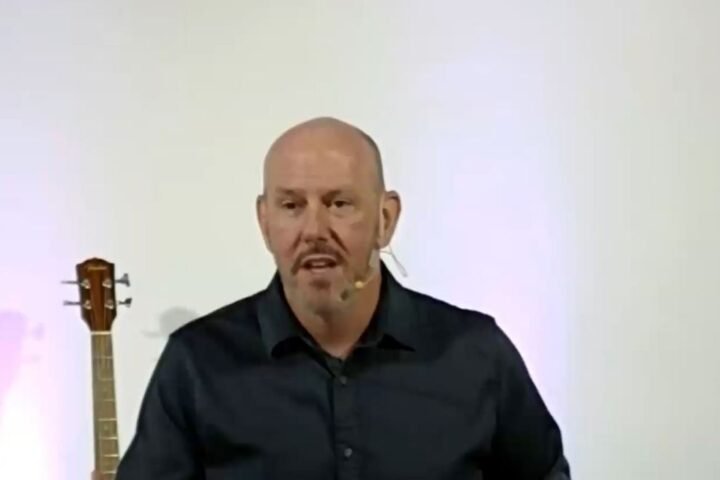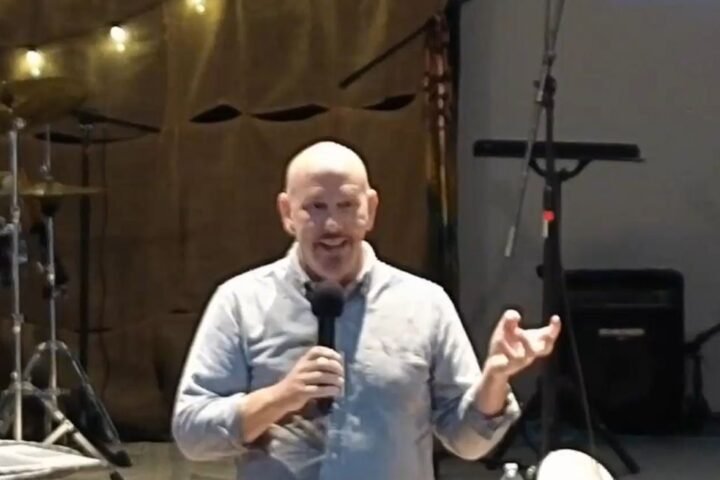Sermons from 2025 (Page 2)
Spiraling Faith
Sermon text: Mark 6:30-44 “Moving from Panic to Surrender.” Faith is not a straight climb upward but a spiraling journey where panic often gives way to surrender; and in every loop, Jesus meets us in our fear, multiplies our small offering, and renews us with His abundance. Stained glass at St. Andrew Catholic Church in Coral Springs, Florida.
Propelled by Tension
Sermon text: Mark 6:1-29 Surrendering Our Mixed Responses into Mission–“The kingdom won’t let us stay neutral — unbelief rejects, fear resists, and faith obeys — and in the tension, Jesus carries us forward.”
Radically In, Radically Out, Radically Secure
Sermon text: Luke 10:1-24 Jesus rejoiced when everyday followers lived on mission. Discover how being radically in, radically out, and radically secure brings lasting joy that nothing can take away.
Guest Speaker Bob Kay
Bob Kay and his wife Judy have been missionaries in Haiti and the Dominican Republic. They are now serving in a nearby church, focusing on ministry to Spanish-speaking people.
Guest Speaker Toney McDonald
Toney has been a friend of our fellowship for many years. His testimony is one of redemption, victory, and a personal mission to tell as many people as he can about Jesus .
Death, Conflict, Transformation, Mission
Sermon text: Mark 5:1-20 “How Jesus turns hopeless cases into missional powerhouses.” Every disciple walks through four movements: death, conflict, transformation, and mission. Mark 5 shows us how Jesus steps into our brokenness, restores our identity, and sends us out to tell what the Lord has done. Header image by Daniel Sealey on Unsplash.
Living on Mission without Losing Heart
Sermon text: Mark 4:21-41 Life can feel discouraging when our efforts seem invisible, our progress slow, and storms threaten to sink us. But in Mark 4, Jesus shows us how to live in victory on His mission—not by hiding our faith or forcing results, but by shining His light, trusting His timing, starting small with faith, and facing opposition with courage. Discover how the same Jesus who lights the darkness, grows seeds into harvest, and calms raging storms is still…
Get the Wax Out!
Sermon text: Mark 4:1-20 How you hear shapes how you obey. In the Parable of the Soils, Jesus shows that the Great Commission takes root only in receptive hearts. Discover how to know your heart, cooperate with God to cultivate good soil, and bear lasting fruit. Header image by onehundredseventyfive on Unsplash.
Stirred, But Not Shaken
Sermon text: Mark 3:20-35 Standing Firm In a World That Pressures You to Change Back: Both Jesus’ family and the religious leaders feel threatened by His growing influence. Their response is to control the threat by mislabeling Him—either as mentally unstable or demonic. Jesus refuses to be defined by their labels. Instead, He redefines both His identity (as Spirit-empowered Savior) and the concept of family (as those who do God’s will). In doing so, He invites us into a new…
From the Crowd to the Core
Sermon text: Mark 3:1-19 Jesus isn’t looking for spectators—He’s calling disciples. In the focal passage, we see a Savior who confronts critics, draws in the desperate, and then climbs a mountain to call out a core. While some in the crowd only watched to accuse and others came merely to receive, Jesus invites us to something far greater: to be with Him and to be sent by Him. Every Christian can move from passive observer to active disciple by answering…
The Only Message
Sermon text: 1 Corinthians 1:1-18 Most church goers, as well as many who never go to church, believe that they will go to heaven when they die. The problem is that many of them are trusting on something they’ve done, their family background, or some other human endeavor for their entrance into God’s presence. Sadly, as Toney McDonald notes, “People are dying and going to hell from the church pews by the gazillions!” Why? Because it is only through faith…
Three Things to Know
Sermon text: Acts 8:25-40 The Christian life isn’t supposed to be passive. Every one of us has a mission to fulfill while we’re here on earth. With Philip and the Ethiopian eunuch as a backdrop, Toney McDonald explains that believers need to know three things: we need to know when we are send, we need to know the message, and we need to know the assignment. Header image by Malcolm Lightbody on Unsplash.












